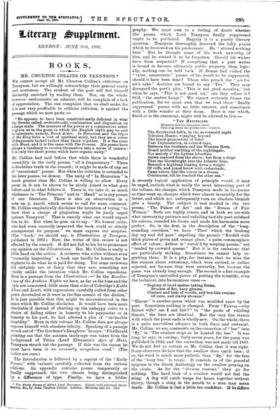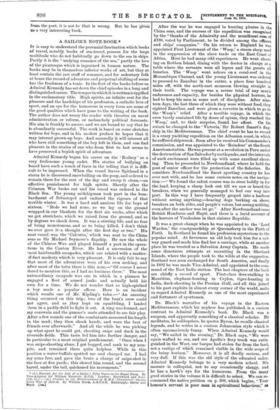BOOKS.
MR. CHURTON COLLINS ON TENNYSON.*
Ws cannot accept all Mr. Churton Collins's criticisms on Tennyson, but we willingly acknowledge their general sanity and acuteness. The student of the poet will feel himself distinctly enriched by reading them. Nor, on the whole, however enthusiastic an admirer, will he complain of a lack of appreciation. The one complaint that we shall make, for it is not very profitable to criticise criticism, is against the passage which we now quote :— " He appears to have been constitutionally deficient in what the Greeks called architektonike, combination and disposition on a large scale. The measure of his power as a constructive artist is given us in the poem in which the English idylls may be said to culminate, namely, Enoch Arden. In Memoriam and the Idylls of the Sing have a sort of spiritual unity, but they are a series of fragments tacked rather than fused together. It is the same with Maud, and it is the same with The Prnicess. His poems have always a tendency to resolve themselves into a series of cameos; it is only the short poems which have organic unity."
Mr. Collins had said before that while there is wonderful versatility in the early poems, " all is fragmentary." There is doubtless truth in the remark; it might be made of any set of "occasional" poems. But when the criticism is extended to the later poems, we demur. The unity of "In Memoriam" is much greater than Mr. Collins is willing to allow. Every poem in it can be shown to be nicely joined to what goes before and to what follows it. There is, we take it, as much wholeness in "The Princess" and in "Maud" as in any poems of our literature. There is also an observation in a note on p. xxxvii. which seems to call for some comment.
3Ir. Collins emphatically disclaims the intention of trying "to show that a charge of plagiarism might be justly urged against Tennyson." That is exactly what one would expect him to do. But when he goes on to say: No honest, critic, who had even cursorily inspected the book, could so utterly misrepresent its purpose," we must express our surprise. (The "book," we should say, is Illustrations of Tennyson,
published in 1891.) Now, the writer of this review is not affected by the remark. It did not fall to his lot to pronounce any opinion on the Illustrations. But Mr. Collins is really a little hard on the critics. A reviewer who writes without even " cursorily. inspecting" a book can hardly be honest, for he neglects to do what he is paid for doing. Yet some reviewers- did certainly see, or fancy that they saw, something not wholly unlike the intention which Mr. Collins repudiates.
Here is a passage from the Illustrations :—"In the Recollec- tions of the Arabian Nights we have, as far as the tone and the tyle are concerned, little more than echo of Coleridge's Kubla Khan and Lewti, with expressions carefully culled from other poets dovetailed as it were in the fine mosaic of the diction."
It is just possible that this might be misunderstood in the sense which Mr. Collins disclaims. It would have been more charitable if instead of shutting up the unhappy critic to a choice of failing either in honesty to his paymaster or in honesty to his poet, he had allowed a plea of invincible stupidity." Even in this volume Mr. Collins does not always express himself with absolute felicity. Speaking of a passage struck out of "The Gardener's Daughter," he says; "FitzGerald pointing out that the autumn landscape was taken from the background of Titian (Lord Ellesmere's Ages of Man),
Tennyson struck out the passage. If this was the reason he must have been in an unusually scrupulous mood." (The italics are ours.)
The Introduction is followed by a reprint of the "Early Poems," with variants carefully collected from the various
editions. An appendix contains poems temporarily or finally suppressed, the two classes being distinguished by a difference of type. Finally, we have a biblio- The Jgarly Poems of Alred, Lord Tennyson. Edited, with &Critical Intro. tietion, ice., by John Churton Collins. London; Methuen and Co. Ds.]
graphy. We must own to a feeling of doubt whether the poems which Lord Tennyson finally suppressed ought to be published. Happily it is a purely literary question. Tennyson thoroughly deserved the lofty praise which he bestowed on his predecessor. He "uttered nothing base." But he thought some of his work unworthy of him, and he wished it to be forgotten. Should his wishes have been respected ? If everything that a poet writes is bound to become ultimately public property, then, logic- ally, nothing can be held back. If Donne had wished the " vaine, amatorious " poems of his youth to be suppressed, should it have been done? Those who preach the art for art's sake" doctrine are bound to say "Yes." They may disregard the poet's plea, "This is not good morality," hut when he says, "This is not good art," can they refuse it ? Still, "the matter hangs." We cannot seriously blame the publication, for we must own that we read these S' finally suppressed" poems with no little interest, and sometimes with a little wonder at their doom. Here is one which, florid as is the ornament, might well be allowed to live
"THE HESPERIDES.
Hesperus and his daughters three
That sing about the golden tree.—cosws.
The Northwind fall'n, in the newstarad night Zidonian Hanno, voyaging beyond The hoary promontory of Soloe
Past Thymiaterion, in calmed bays,
Between the Southern and the Western Horn, Heard neither warbling of the nightingale, Nor melody o' the Lybian lotusilute blown seaward from the shore ; but from a slope That ran bloombright into the Atlantic blue, Beneath a highland leaning down a weight Of cliffs, and zoned below with cedarshade, Came voices, like the voices in a dream, Continuous, till he reached the other sea."
A severely logical application of principle would, it may be urged, exclude what is really the most interesting part of the volume, the changes which Tennyson made in his poems as time went on, changes which were almost invariably for the better, and which not unfrequently turn an absolute blemish into a beauty. The subject is best studied in the two poems, "The Palace of Art" and the "Dream of Fair Women." Both are highly ornate, and in both we see with what unwearying patience and unfailing tact the poet subdued his colours, rounded his forms, and made his harmonies more perfect. So, in the first, in the description of the "long- sounding corridors," we have " Thro' which the livelong day my soul did pass" expelling the prosaic "Roofed with thick plates of green and orange glass," a quite commonplace effect of colour; Arthur is " watch'd by weeping queens," not "tended by crowned queens." But it is the omissions that are particularly striking. Sometimes we cannot help re- gretting them. It is a pity, for instance, that we miss the fine stanzas about astronomy, which were excised, or rather rejected, not because they were unworthy, but because the poem was already long enough. The second is a fine example of Tennyson's unrivalled power of putting the scientific, even the technical, into harmonious verse :—
"Regions of lucid matter taking forms, Brushes of fire, hazy gleams,
Clusters and beds of worlds, and bee-like swarms
Of suns, and starry streams."
" tEnone" is another poem which was moulded anew by the
poet. Sometimes nothing is changed. From "Fairest—why fairest wife? am I not fair ? " to "the pools of whirling
Simois," the lines are identical. But the very fine stanza with which the poem ends is wholly new. On the whole, there is a quite marvellous advance in both force and restraint.
Mr. Collins, we see, comments on the correction of " bee " into "fly," in "The swallow stopt as he hunted the bee." It was long, he says, in coming ; forty-seven years, for the poem was published in 1842, and the correction was not made till 1889. We do not feel so certain as Mr. Collins that it was right. Some observers declare that the swallow does catch bees ; if so, the word is much more pathetic than "fly," for the fate of the "busy bee" is tragic. It reminds us of the graceful epigram in the Greek Anthology on the swallow preying on
the cicala. As for the "obvious reasons," they go for nothing. The hard beak of a swallow would not feel the sting. A dog will catch wasps for hours together without injury, though a sting in the mouth to a man may mean death. Mr. Collins is just a little too confident If he differs from the poet, it is not he that is wrong. But he has. gifeil us a very interesting book.



















































 Previous page
Previous page